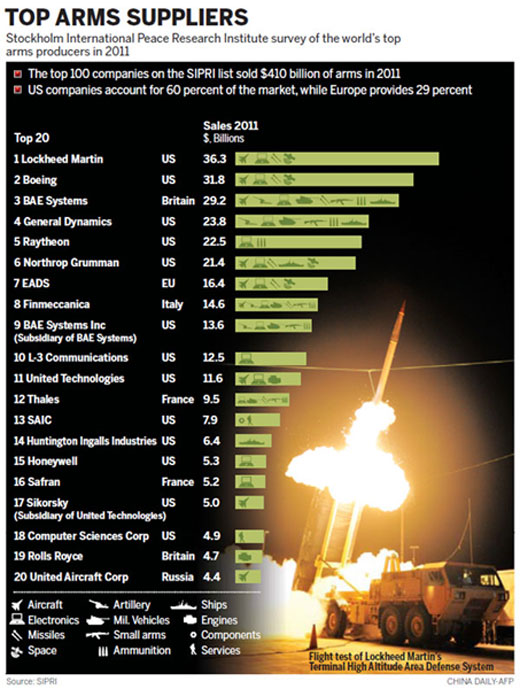Weapons makers see major sales drop
Updated: 2013-02-20 09:42
(China Daily/Agencies)
|
||||||||
Arms sales by the 100 biggest weapons makers fell in 2011 - the first time since the mid-90s - as economies slowed and military equipment purchases reduced for operations in Afghanistan and Iraq, a leading think tank said on Monday.
Sales totaled $410 billion, a 5 percent fall adjusted for currency swings, from $411 billion in 2010, the Stockholm International Peace Research Institute, which carries out independent research on international security, armaments and disarmament, said in a statement.
|
 |
"Austerity policies and proposed and actual decreases in military expenditure as well as postponements in weapons program procurement affected overall arms sales in North America and Western Europe," it said.
"The drawdowns in Iraq and Afghanistan and the sanctions on arms transfers to Libya also played a role."
Proposed austerity measures "have led some companies to pursue military specialization, while others have downsized or diversified into adjacent markets" such as security and in particular cybersecurity, the think tank said.
Spending fell for the first time since the mid-90s, when defense spending had been falling after the end of the Cold War, said Susan Jackson, a researcher at SIPRI.
Sales growth had already slowed to 1 percent in 2010, down from 8 percent in 2009, as the withdrawal of foreign troops from Iraq held back demand.
To the extent arms makers are affected by economic swings, many are late-cyclical as they have long delivery times and long-running contracts with governments.
Of the firms monitored in 2011 by the group, 74 were based in the United States and western Europe, generating about 90 percent of the sales, roughly unchanged from 2010.
US, Europe dominate
The list of the top 100 arms-producing companies is dominated by US and European companies, which respectively hold 60 and 29 percent of the global market and together hold the top 17 spots.
US group Lockheed Martin is No 1, with sales of $36.3 billion in 2011, ahead of another US group, Boeing, and followed by BAE Systems of Britain in third.
The think tank, which specializes in research on conflicts, weapons, arms control and disarmament, was created in 1966 and is 50 percent financed by the Swedish state.
It defines arms sales as "sales of military goods and services to military customers, including both sales for domestic procurement and sales for export".
In the 2002-11 period, arms sales by the top 100 firms grew 51 percent, SIPRI said.
Reuters-AFP

 Li Na on Time cover, makes influential 100 list
Li Na on Time cover, makes influential 100 list
 FBI releases photos of 2 Boston bombings suspects
FBI releases photos of 2 Boston bombings suspects
 World's wackiest hairstyles
World's wackiest hairstyles
 Sandstorms strike Northwest China
Sandstorms strike Northwest China
 Never-seen photos of Madonna on display
Never-seen photos of Madonna on display
 H7N9 outbreak linked to waterfowl migration
H7N9 outbreak linked to waterfowl migration
 Dozens feared dead in Texas plant blast
Dozens feared dead in Texas plant blast
 Venezuelan court rules out manual votes counting
Venezuelan court rules out manual votes counting
Most Viewed
Editor's Picks

|

|

|

|

|

|
Today's Top News
Live report: 7.0-magnitude quake hits Sichuan, heavy casualties feared
Boston suspect cornered on boat
Cross-talk artist helps to spread the word
'Green' awareness levels drop in Beijing
Palace Museum spruces up
First couple on Time's list of most influential
H7N9 flu transmission studied
Trading channels 'need to broaden'
US Weekly

|

|







